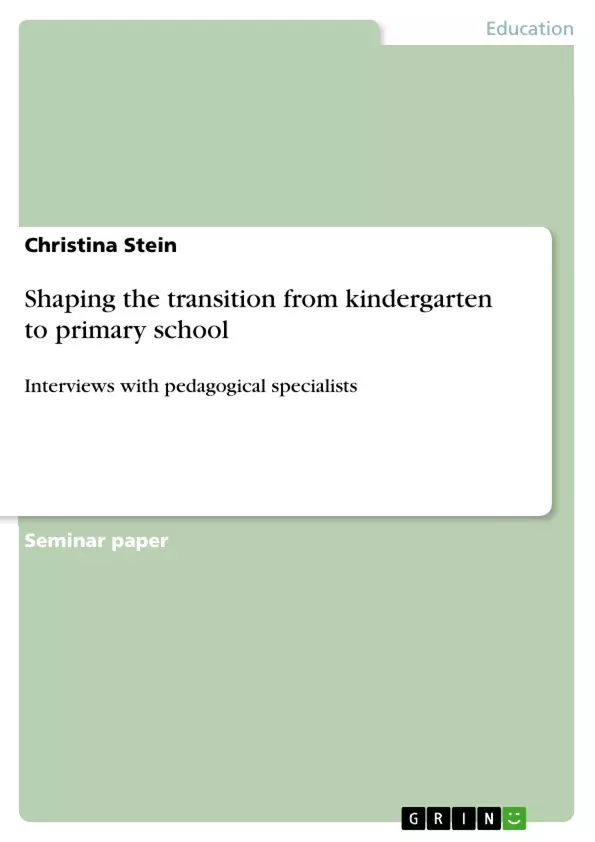The term paper takes a closer look at the transition process from kindergarten to primary school, focusing on the transition design of the educational professionals. The work is mainly composed of a literature review and also refers to three interviews that were conducted with educational professionals from three different institutions. The aim is to get to know the ideas and implementations of transition management and to compare them with the literature. The question that the paper wants to answer is therefore: How do educational professionals design the transition from kindergarten to primary school?
First, the term "transition" will be defined in more detail and a general insight into the transition process from kindergarten to primary school will be given. This is followed by a short method section, which describes the interview procedure and introduces the interviewees. The main part, and thus the focus of the paper, deals with the design of the transition process and includes both current literature and the results of the interviews with the three educational professionals. Finally, the concluding section revisits the most important findings and draws a conclusion.
At the age of seven, and in some cases also at the age of six, most children face their first major change in life. The start of school is getting closer and closer and the last errands for backpacks, pencil cases and exercise books are done together with the parents. It is understandable that such a big event is the highlight of the preschool child's still so young life. This is precisely why the child's current personal environment, his or her family and the preschool institution, has an important role to play in the transition from kindergarten to primary school.
Inhaltsverzeichnis (Table of Contents)
- 1. Introduction
- 2. "Transition"
- 2.1 Name and definition
- 2.2 Transition from kindergarten to primary school
- 2.3 The role of kindergarten and school
- 3. Methods part - Own investigation
- 3.1 Presentation of the interlocutors
- 3.2 Implementation
- 4. Shaping the transition
- 4.1 Basics
- 4.2 Transitional arrangement with the preschool child
- 4.2.1 Preschool programs
- 4.2.2 Picture books
- 4.2.3 Language, literacy and other precursor skills
- 4.3 Transitional design with the involvement of the school and the parents
- 4.3.1 Cooperation between kindergarten and school
- 4.3.2 Parent talks
- 5. Conclusion
- 6. End
Zielsetzung und Themenschwerpunkte (Objectives and Key Themes)
This term paper investigates the transition process from kindergarten to primary school, focusing on the design of the transition from the perspective of pedagogical specialists. It analyzes existing literature and incorporates interviews with pedagogical specialists from various institutions. The objective is to understand the ideas and practices of transition design and compare them with existing research. The primary question explored is: "How do pedagogical specialists shape the transition from kindergarten to primary school?"
- The importance of a smooth and successful transition from kindergarten to primary school for children's well-being and future academic success.
- The different perspectives and approaches of pedagogical specialists in shaping the transition process.
- The role of preschool programs, picture books, and literacy skills in preparing children for primary school.
- The importance of collaboration between kindergarten and school, as well as communication with parents, in supporting the transition process.
- The challenges and potential pitfalls associated with the transition from kindergarten to primary school.
Zusammenfassung der Kapitel (Chapter Summaries)
The first chapter introduces the topic of transition, outlining its importance and significance in a child's development. Chapter two provides a detailed definition of "transition" and examines the specific challenges and expectations associated with the transition from kindergarten to primary school. It also discusses the role of both kindergarten and school in supporting this transition. Chapter three details the methodology employed in the research, introducing the pedagogical specialists involved in the interviews and outlining the research process. Chapter four delves into the practical implementation of transition design, focusing on the different strategies employed by pedagogical specialists, such as preschool programs, picture books, language development activities, and collaboration with parents and the school.
Schlüsselwörter (Keywords)
The key concepts explored in this term paper include transition, kindergarten, primary school, pedagogical specialists, transition design, preschool programs, picture books, literacy skills, collaboration, parent involvement, and school readiness.
Frequently Asked Questions
How do pedagogical specialists design the transition to primary school?
Specialists use various methods such as preschool programs, language development activities, and the integration of picture books to prepare children for the classroom environment.
What is the role of the kindergarten in this transition process?
The kindergarten acts as a supportive environment that fosters precursor skills like literacy and social competence, helping children feel confident about the upcoming change.
Why is collaboration between kindergarten and primary school important?
Active cooperation ensures a continuous educational path for the child, reduces anxiety, and allows teachers to better understand the individual needs of incoming students.
How are parents involved in the transition design?
Pedagogical specialists engage parents through regular talks and information sessions to ensure a holistic support system for the child at home and in school.
What are "precursor skills" for primary school?
These include basic language skills, literacy, mathematical understanding, and fine motor skills, which are essential for a successful start in first grade.
What challenges do children face during this transition?
Children face a major change in their daily routine, new social structures, and increased academic expectations, which requires careful emotional and organizational preparation.
- Citation du texte
- Christina Stein (Auteur), 2015, Shaping the transition from kindergarten to primary school, Munich, GRIN Verlag, https://www.grin.com/document/1175587



